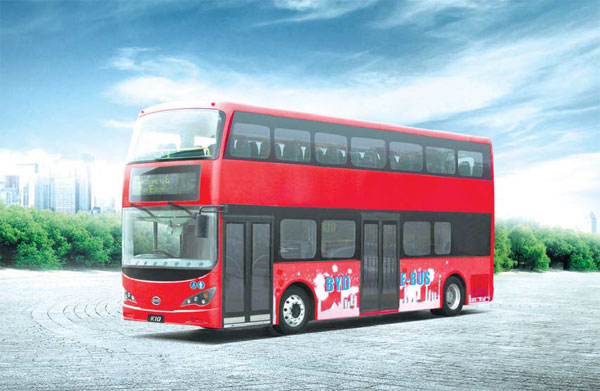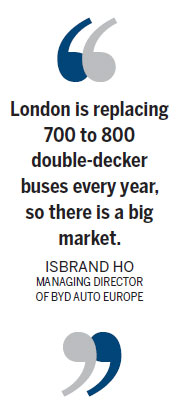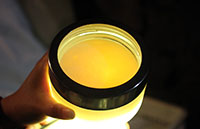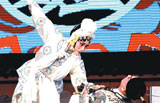BYD targets London's iconic double-decker
Updated: 2015-07-17 09:07
By Cecily Liu(China Daily Europe)
|
|||||||||||
 |
|
The electric zero-emissions double-decker bus designed by BYD. Photos Provided to China Daily |
Chinese automaker has designed first zero-emissions bus
Chinese automotive manufacturer BYD has designed and built the world's first pure electric zero-emission double-decker bus, which will enter service in London in October.
London's red double-decker buses have for years dominated the capital, where nearly 1,000 routes are operated by 8,700 buses, many of them double-deckers. Although there has been a gradual move to hybrid vehicles, many are still diesel-powered.
The electric double-decker bus represents a technology breakthrough in public transportation, and gives BYD the chance to access many new markets, including Europe and Asia, according to Isbrand Ho, managing director of BYD Auto Europe.
"In the past, electric vehicle manufacturers have produced electric buses with three batteries, at the vehicle's front, back and top, but this design would not work with the double-decker bus. BYD's advanced technology is able to make the batteries more compact, so the battery on top of the bus is no longer required," Ho says.
"London has the most-dense population in Europe and has the highest visibility of double-decker buses. London is replacing 700 to 800 double-decker buses every year, so there is a big market," Ho says.
He says the inspiration to supply double-decker buses to London came about two years ago when Wang Chuanfu, chairman of BYD, met with London Mayor Boris Johnson.
"Boris Johnson said to our chairman, 'If you can make it, I will buy it'.

"Actually, electric cars came before gasoline cars, but because of the weakness of the batteries, gasoline cars became more successful. But now is the time for electric cars to take over gasoline cars," Ho says, explaining that the environmental benefit and the fuel cost savings of electric vehicles give them a distinct advantage.
Denis Naberezhnykh, head of ultra-low emission vehicle and intelligent transportation system technology at the UK's Transport Research Laboratory, praised BYD's achievement.
"Until now, fully electric double-decker buses have been considered unfeasible. This is mainly due to the competing requirements for battery space and passenger capacity," Naberezhnykh says.
He says unlike their single-decker counterparts, double-decker buses in London typically cannot accommodate batteries on the roof due to the height limits of the vehicle.
"A purely electric double-decker bus not only provides further options for the electrification of London's bus fleet, but with growing pressure to improve air quality in cities and the impending introduction of the Ultra-Low Emission Zone in London, it provides another way of reducing emissions," Naberezhnykh says.
"Over the next few years, we can expect to see a growing shift toward the electrification of public transport vehicles, as we seek to reduce air pollutants in urban centers and improve local air quality. Ensuring that these vehicles are able to operate the demanding duty cycles without excessive charging time requirements will be a vital factor in accelerating this shift."
London has already introduced hybrid buses in a bid to reduce the environmental impact of public transport.
The latest development is the New Routemaster bus, designed by English designer Thomas Heatherwick, which is 15 percent more fuel efficient than the existing hybrid buses and 40 percent more efficient than conventional diesel double-deckers.
The first New Routemaster vehicles, nicknamed "Boris buses" after the mayor of London, began service on a limited number of routes in 2012, and it is planned that more than 600 of the buses will enter passenger service by 2016.
BYD chose London for the launch of the all-electric double-decker bus because of the vehicle's iconic significance, but the same technology can be applied to many other markets, including European markets such as Germany and Asian markets such as Hong Kong, Malaysia and Singapore.
Many of these markets would require localization of design to suit customer needs, for example, with regards to wheelchair access, but the core technology of battery, control system and electric drivetrain would all be the same, according to Ho.
The first batch of BYD double- decker buses will consist of five vehicles, all manufactured in China. Ho says BYD will explore the possibility of local manufacturing if the quantity supplied increases.
BYD won't disclose the cost of the buses, explaining that it is highly dependent on customer specifications and volume, but says the electric buses can help save about 70 percent of the costs of fuel, producing long-term savings.
Today's Top News
China, World Bank pledge $50m for poor
Industries should be on digital Silk Road to expand market
'Occupy Central' leaders to stand trial
Europe moves to restore funding to Greece after bailout vote
MH17 final report to be published in October
ECB raises Greek bank funding as Europe backs new loan
Greek parliament approves debt deal and reforms
British boy with eczema wins support from Chinese Internet users
Hot Topics
Lunar probe , China growth forecasts, Emission rules get tougher, China seen through 'colored lens', International board,
Editor's Picks

|

|

|

|

|

|






